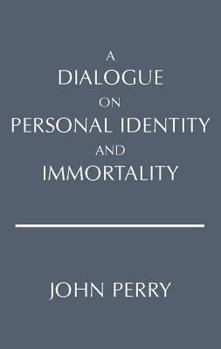A Dialogue on Personal Identity and Immortality
Select Format
Select Condition 
Book Overview
Perry's excellent dialogue makes a complicated topic stimulating and accessible without any sacrifice of scholarly accuracy or thoroughness. Professionals will appreciate the work's command of the... This description may be from another edition of this product.
Format:Paperback
Language:English
ISBN:0915144530
ISBN13:9780915144532
Release Date:March 1978
Publisher:Hackett Publishing Company
Length:72 Pages
Weight:0.25 lbs.
Dimensions:0.2" x 5.2" x 8.3"
Customer Reviews
4 ratings
Just an introduction, but an excellent one
Published by Thriftbooks.com User , 18 years ago
If you are interested in a philosophical analysis of personal identity, you will not find a better introduction than this little volume. It is, however, just an introduction. It raises issues without fully developing them, which is fine, since it does not pretend to be more than an introduction. For the same reason it omits various issues. The most important omitted issue IMO is the view of the Buddha, David Hume, Derek Parfit and doubtless others that personal identity is in a sense an illusion. To get deeper into these issues, I recommend Part III of Parfit's Reasons and Persons. One quibble: notwithstanding the book's title, it does not discuss immortality. Survival after death is neither a necessary nor a sufficient condition for immortality.
If you like Philosophy and the Socratic method, you'll love this!
Published by Thriftbooks.com User , 18 years ago
I purchased this book for a college course in Philosophy. I expected it to be boring, but to my surprise it was very interesting. If you want to be a lawyer or politician, you might want to consider purchasing this book. Socrates was brilliant and questioned everything, as dictated by Plato. Also, I am a first time student of Philosophy and before taking the course thought I would not be able to deal with it because I rarely question the things around me--but this book proves that even if you are more of a simple minded person, you can still wrap your thoughts around certain things that Socrates questions that today still have no specific definitions. It is a thin book, with few pages, but it is full of a lot of knowledgeable ideas and concepts that do take some re-reading to fully comprehend Socrate's methods. I highly recommend this book!
a joy to read
Published by Thriftbooks.com User , 18 years ago
In this delightful booklet John Perry, a philosophy professor at Stanford, discusses personal identity and immortality. It is implied that immortality is meaningless without personal identity, and therefore almost the entire argument is about personal identity really. The setting of the dialogue is dramatic: a philosophy teacher, Gretchen, lies dying in a hospital after a motorcycle accident. She is visited by two friends: Sam, a chaplain, and Dave, a former student. She asks them to comfort her and gives them an apparently easy task: to show that it is possible for personal identity to survive the death of the body. She does not ask them for good evidence or some probability estimate of this happening - but just for the logical possibility of the survival of personal identity. In other words she questions whether the idea of personal survival is even coherent, if it makes any sense at all. Of course Sam and Dave find it very difficult to convince her. I found the dialogue very readable with some flashes of humor, expressions of passion, anger, sadness - the whole lot one would expect in such a setting. And at the same time we get a good philosophical debate. Excellent. In the second night all three agree that personal identity is contingent on memory, or rather on the continuity of memory, but in a way I found very puzzling they all also immediately agree that there is an important distinction to be made between what one really remembers and what one only seems to remember. This, I think, is a big mistake. There is of course an obvious difference between an atomic explosion and the simulation of an atomic explosion, but as far as experience goes "is" and "seems" are identical. When I see a red apple it makes no sense to wonder whether I may only seem to be seeing a red apple. There is no difference playing chess and simulating the playing of chess. Still, based on the distinction between remembering and seeming to remember Gretchen shoots down all arguments Sam and Dave propose for defending the very possibility of survival of personal identity after the death of the body. But, by that standard, personal identity is not possible even before death. After all how can I be certain that I remember my past? Maybe I only seem to remember what happened yesterday. Gretchen might have answered that the continuity of the body (and particularly of the brain) before death proves that what I remember is real - but then how do I know that yesterday I had the same body I have today? Maybe this too is a wrong memory. Another error I found in the argumentation is that the continuation of personal identity after the death of the body is imagined only through the recreation of a "heavenly person". This arbitrarily assumes that the "person" disappears at the death of the body and must therefore be recreated somehow - which shows that by "person" Perry (as all three characters in the dialogue agree on that) imagines some kind of body. To be fair in the first
Simply good philosophy
Published by Thriftbooks.com User , 22 years ago
This work offers penetrating insight into a topic that has been central to philosophy since Plato. What is the self? What does it mean for a self to persist over time? Perry addresses this topic with a clean and clear writing style--and with excellent arguments. Anyone who wishes to dive into the difficult topic of the metaphysics of personal identity is advised to start here.




